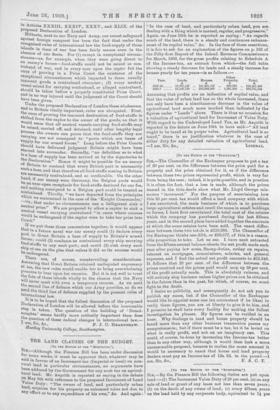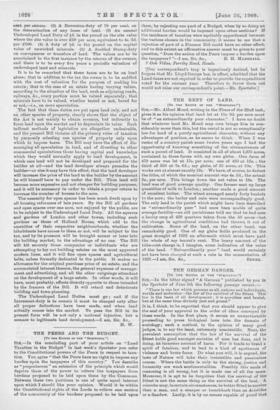[TO itorron OP T1111 " sr Harwrotvi
SIR,—By the Finance Bill the following duties are put upon laud :—(1) The Increment Value Duty of 20 per cent. (a) on any sale of land or grant of any lease not less than seven years; (5) on the death of any owner of land; (c) every fifteen years on the land held by any corporate body, equivalent to li per
cent. per annum. (2) A Reversion-duty of 10 per cent, on the determination of any lease of land. (3) An annual Undeveloped Land Duty of id. in the pound on the site value where the site value is over £50 per acre, equivalent to 4s. 2d. per £100. (4) A duty of id. in the pound on the capital value of unworked minerals. (5) A doubled Stamp-duty on conveyances or transfers of land. The values are to be ascertained in the first instance by the returns of the owners, and there is to be every five years a periodic valuation of undeveloped land and minerals.
It is to be remarked that these taxes are to be on land alone; that in addition to the tax the owner is to be saddled with the cost of valuation for the purpose of making his return ; that in the case of an estate having varying values, according to the situation of the land, such as adjoining roads, railways, &ea every portion must be valued separately ; that minerals have to be valued, whether tested or not, bored for
or on mere speculation.
The fact that these duties are put upon land only, and not on other species of property, clearly shows that the object of the Act is not mainly to obtain revenue, but indirectly to force land upon the market and to depreciate its value. Such indirect methods of legislation are altogether undesirable, and the present Bill violates all the primary rules of taxation by purposely selecting one species of property only upon which to impose taxes. The Bill may have the effect of dis- couraging all speculation in land, and of diverting to other commercial speculations those having capital and knowledge which they would normally apply to land development, in which case land will not be developed and prepared for the builder at all—and the land developer always precedes the builder—or else it may have this effect, that the land developer will increase the price of the land to the builder by the amount he will himself have to pay under the Bill. Thus land will become more expensive and not cheaper for building purposes, and it will be necessary in order to obtain a proper return to increase the number of houses to the acre.
The necessity for open spaces has been much dwelt upon by all housing reformers of late years. By the Bill all gardens and open spaces over one acre, not enjoyed by the public, are to be subject to the Undeveloped Land Duty. All the squares and gardens of London and other towns, including such gardens as those of Holland House, which add to the amenities of their respective neighbourhoods, whether the inhabitants have access to them or not, will be subject to the tax, and by its pressure will be brought sooner or later into the building market, to the advantage of no one. The Bill will hit severely those companies or individuals who are attempting to lay out building estates on the most approved modern lines, and it will fine open spaces and agricultural belts, unless formally dedicated to the public. It makes no allowance for the original purchase price of an estate, and the accumulated interest thereon, the general expenses of manage- ment and advertising, and all the other outgoings attendant on the development of a large estate. In other words, it will have, most probably, effects directly opposite to those intended by the framers of the Bill. It will retard and deteriorate building and town-planning.
The Undeveloped Land Duties must go ; and if the Increment-duty is to remain it must be charged only after all proper deductions have been made, and when land actually comes into the market. To pass the Bill in its present form will be not only a national injustice, but a menace to legitimate land development.---I am, Sir, &o., H. W.



























































 Previous page
Previous page